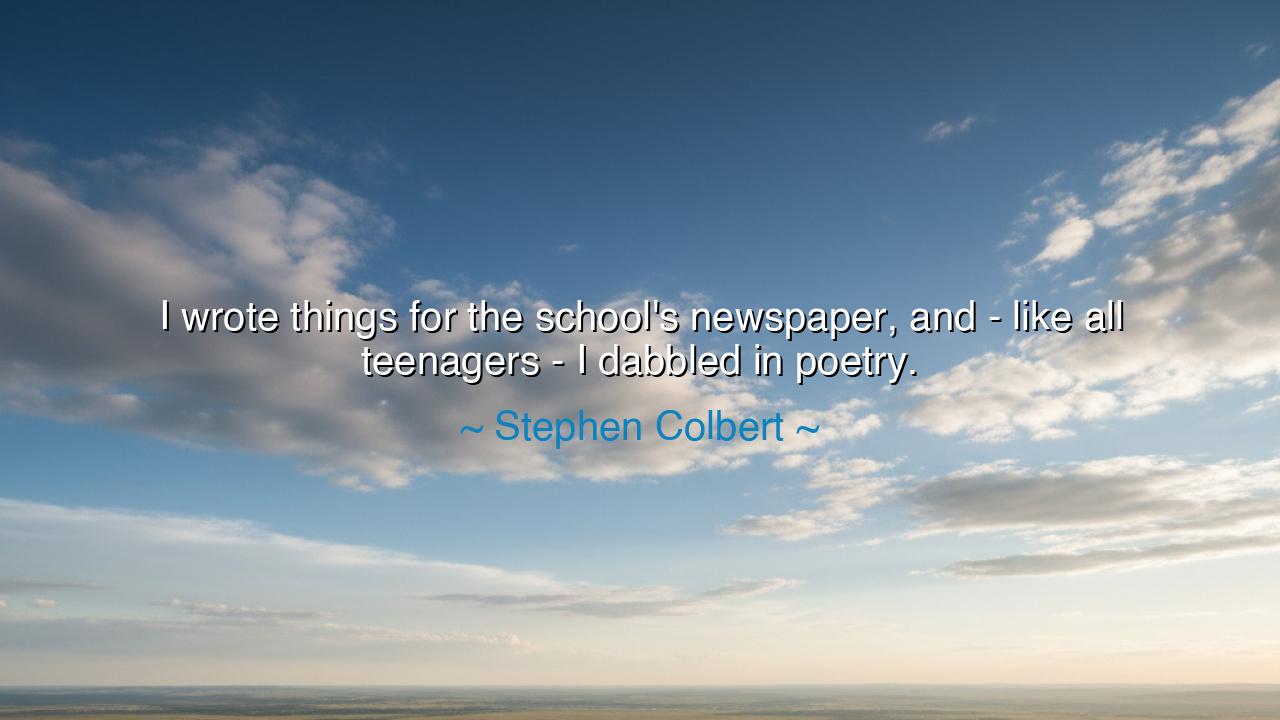
I wrote things for the school's newspaper, and - like all
I wrote things for the school's newspaper, and - like all teenagers - I dabbled in poetry.






“I wrote things for the school’s newspaper, and—like all teenagers—I dabbled in poetry.” Thus speaks Stephen Colbert, in a voice touched with humor but also with quiet truth. For behind his jest lies a universal insight: that youth, restless and searching, almost inevitably turns toward poetry. When the heart is still unformed yet already yearning, when the soul feels too much and understands too little, words clothed in verse become the natural language of discovery.
The meaning of this saying rests in the fact that adolescence is an age of awakening. The teenager stands between childhood and adulthood, full of wonder and confusion, longing to give shape to feelings that seem too vast for prose. It is then that many first reach for poetry, even if clumsily, even if briefly. To “dabble” in poetry is to take the first steps on the long road of self-expression, to practice the sacred art of finding language for the unspoken.
The origin of this impulse is as old as humanity itself. In ancient Greece, the young were taught Homeric verses to shape their souls; in China, students memorized the lines of Confucian poets as a way to channel their emotions into harmony. Across cultures, youth has always reached for rhythm, image, and song. Colbert, in recalling his own school newspaper and tentative verses, places himself within this ancient lineage. Though he may laugh at his own efforts, he speaks of a timeless truth: poetry is the first tool the young use to measure the depths of their own hearts.
Consider the story of Arthur Rimbaud, who wrote his visionary poems before the age of twenty. His verses were wild, chaotic, incandescent—born of youth’s refusal to accept limits. Though his career as a poet was brief, his influence was vast, because he dared, as a teenager, to put his burning emotions into words. This is the same energy Colbert recalls, even if less dramatic: the raw, unpolished attempt of youth to speak what it feels. To dabble is no small thing—it is to begin.
The lesson here is profound: never despise the small beginnings of youth. A teenager’s awkward poem, written in the margins of a notebook, may not endure as art—but it endures in the soul that wrote it, as a first attempt to make sense of life. Such exercises teach courage: the courage to speak, to feel, to be vulnerable. Even if the words are clumsy, the act itself is sacred. It is the seed from which greater forms of expression may later grow.
Practically, this means that we should encourage the young in their experiments with words. If they dabble, let them dabble freely. Do not demand perfection; do not crush the impulse with ridicule. Give them books, give them pens, give them silence in which to write. And for ourselves, let us remember that the instinct to shape emotion into verse never truly leaves us. Even as adults, we may still turn to poetry when prose feels too heavy.
Thus the teaching endures: to dabble in poetry is not merely a teenage phase, but a human inheritance. It is the moment when speech rises toward song, when thought begins to search for beauty. Stephen Colbert, with his light words, reveals a serious truth: poetry belongs to all of us, and its beginnings are often humble. Let us honor those beginnings, in ourselves and in others, for they are the first sparks of the fire by which humanity speaks its deepest truths.






AAdministratorAdministrator
Welcome, honored guests. Please leave a comment, we will respond soon